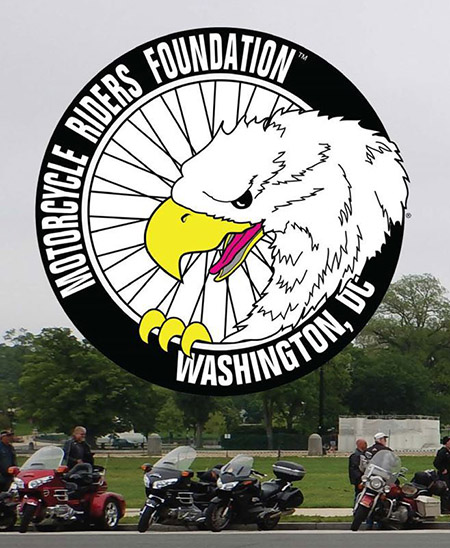 United States – Washington DC -The Motorcycle Riders Foundation (MRF) – Through a piece of legislation in a Highway Bill, a Motorcyclist Advisory Council (MAC) was created in 2005 to coordinate with and counsel the Administrator of the Federal Highway Administration (FHWA) .
United States – Washington DC -The Motorcycle Riders Foundation (MRF) – Through a piece of legislation in a Highway Bill, a Motorcyclist Advisory Council (MAC) was created in 2005 to coordinate with and counsel the Administrator of the Federal Highway Administration (FHWA) .
The 2005 law called for the Administrator of the Federal Highway Administration to have a dialogue with the motorcycle community on infrastructure issues of concern to motorcyclists.
This Council had 10 members consisting of representatives from the motorcycling community as well as individuals with professional expertise in national motorcyclist safety. According to the 2005 law, four of the ten council members were to include members of the motorcycling community from various state and federal motorcycle associations. The other 6 members would serve to provide the necessary technical expertise related to roadway design, safety and other issues.
All sounds good so far, however in 2009 the highway bill expired and along with it, so did the Council – the MAC was the only official forum that motorcyclists had to express to authorities at the Department of Transportation the issues they faced on the road.
Roll on to 2016 when the Council was reestablished, this was viewed by the Motorcycle Riders Foundation (MRF) as a positive development to once again open a dialogue between government officials and motorcyclists across the United States.
So, it came as shock when the FHWA announced in January they would only dedicate one seat out of a possible ten for a representative from a motorcycle association on the Council which will run for up to the two year period. Instead the other nine seats were to represent experts in road design, construction, safety and engineering – specific issues of concerns:
(1) Barrier design;
(2) Road design, construction, and maintenance practices; and
(3) The architecture and implementation of intelligent transportation system technologies.
Kirk ‘Hardtail’ Willard, President of the Board of Directors for the Motorcycle Riders Foundation stated, “Despite our best efforts to ensure the motorcycle community had a seat at the table, the FHWA has dismissed our concerns and efforts instead emphasizing council members with safety and engineering backgrounds without any experience actually riding a motorcycle. Including only one motorcyclist in this group is not only imbalanced, unfair and contrary to the mission of the MAC, but it defeats the entire purpose of the Council. The MAC was supposed to carry the voice of motorcyclists – having only one member as an actual motorcyclist will render this Council ineffective.”
Lobbyist for the Motorcycle Riders Foundation Megan Ekstrom said, “It’s unfortunate that the Federal Highway Administration is choosing to move forward with a Motorcyclist Advisory Council that will not be representative of actual motorcyclists. There are over 10 million bikers on the road in the U.S. and those numbers are increasing. This community is desperate to have a dialogue with the Administration and yet, their requests have fallen on deaf ears. This is a perfect example of the government ‘knowing what’s best’ for a diverse community with a unique set of needs. It’s a travesty that none of this will be represented in this so-called ‘Motorcyclist’ Advisory Council.”
Like all rider groups the MRF is not taking this sitting down and started lobbying representatives and in what seems like a complicated world of US political lobbying – the mainstream work of pressure of any good lobbying group.
The Motorcycle Riders Foundation Lobby
Approximately one month after the announcement about the composition of the MAC was issued, letters were sent to the newly confirmed Secretary of Transportation Elaine Chao asking her to ensure that a balanced makeup of the MAC be guaranteed to address motorcyclists’ concerns. The bipartisan Senate letter, led by Senators Tammy Baldwin (Democrat-Wisconsin) and Dan Sullivan (Republican-Alaska) included a total of ten signatories including that of John Thune (Republican-South Dakota), Chairman of the Senate Committee on Commerce, Science, and Transportation which has jurisdiction over transportation-related matters.
The U.S. House of Representatives issued its own letter to Secretary Chao, outlining its concerns with actions by the FHWA, asking the Secretary to go as far as to delay future activity of the MAC until a fair and balanced composition could be reached.
The House letter, led by Representatives’ Tim Walberg (Republican-Michigan), Mark Pocan (Democrat-Wisconsin), Mike Burgess (Republican-Texas) Donald Norcross (Democrat-New Jersey) stated, “It is critical to allow motorcyclists to have a strong voice on this Council. These are the individuals who have experience and can provide a motorcyclist’s insights on the challenges and benefits of our roadways. Depending on where they live, riders have unique experiences and are differently impacted by roadway and barrier design, and construction, among others.”
In total, about forty lawmakers signed onto the letters representing sixteen different states. Still, other lawmakers including Representatives’ Ted Budd (Republican-North Carolina) and Mark Sanford (Republican-South Carolina) called the Federal Highway Administration directly speaking with Michael Griffith, Director of the Office of Safety Technologies within the Agency and the contact for the MAC according to the Federal Register notice. Both registered their opposition on the composition of the Council though reported the response from Griffith was “limited.”
The Federal Highway Administration is accepting nominations to the MAC through February 23. It is unclear as to whether they will look to increase the number of motorcyclists on the Council despite the concerns expressed from various lawmakers and the motorcycle community at-large.
Leading the charge on the issue is the Motorcycle Riders Foundation, the Washington, DC-based organization for the States’ motorcyclists’ rights organizations as well as motorcycle clubs and individual riders.
President of the Board of Directors Kirk ‘Hardtail’ Willard explained the impetus for the organization’s strong stance on this issue, “Motorcyclists deserve robust representation on bodies handling issues that affect their community. It’s a scary world for riders when this all-important dialogue between the federal government and the motorcycling community may very well take place among bureaucrats who have never swung a leg over a motorcycle.”
Leading the charge on motorcycle lobbying via “political contact” campaigning is the bread and butter for rider organisations – the first step!
Original Sources – Motorcycle Riders Foundation (MRF) – www.mrf.org


Leave a Reply